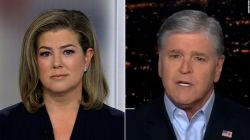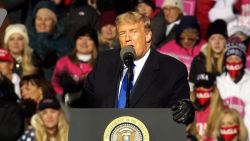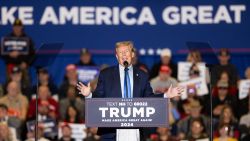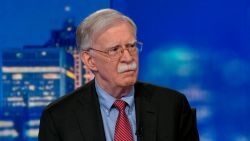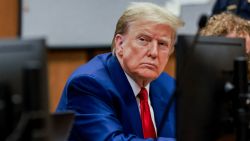Editor’s Note: Nicole Hemmer is an associate research scholar at Columbia University and the author of “Messengers of the Right: Conservative Media and the Transformation of American Politics.” She hosts the history podcast “Past Present” and created the podcast “A12.” The views expressed in this commentary are solely those of the author. View more opinion articles on CNN.
President Donald Trump tweeted and retweeted 80 times between Friday and Sunday, a seemingly panicked flurry of activity that showed just how big a threat the Ukraine scandal and impeachment inquiry are. Among those tweets was a quote from Fox News contributor Robert Jeffress, an evangelical pastor from Texas, who warned that if Trump were successfully removed from office, civil war would follow.

Apocalyptic rhetoric often flows readily from preachers’ pulpits and politicians’ platforms. Yet this warning of a looming civil war takes on a different meaning when it appears on the President’s Twitter feed – not only because of the office he holds, but because he regularly packages his over-the-top doomsaying with specific calls for political violence. He is a president whose words and actions have helped inspire acts of domestic terrorism, like the mass shooting in El Paso in which 22 people were murdered. In an environment in which people have demonstrated a willingness to turn his words into “war,” this is particularly reckless and threatening.
Much of the debate around Trump’s tweet has centered on whether he is dog-whistling to violent groups who promote white supremacy or is just being sloppy. The burden of the presidency, though, is that it doesn’t really matter. When the President invokes violence – as in a civil war – he sends encouragement to supporters already primed to perceive a coming apocalypse.
In the world of white power, where a civil war is a race war, the President’s words have particular resonance. White power activists have long embraced a form of violent nationalism (or violent racism cloaked in nationalism), that is always on the lookout for enemies, from Vietnamese immigrants to black churchgoers to, at times, the federal government itself.
The idea of race-war-as-civil-war has a long history within the white power movement, most notably in “The Turner Diaries,” a racist 1978 novel that imagines a race war in which white people defend themselves first through terrorism and militia violence, and then through wholesale war. The book helped shape Oklahoma City bomber Timothy McVeigh’s terrorism, and remains a favorite among the movement and the alt-right, today.
Promoting the possibility of a civil war would be dangerous in any case, but at a time when white-power terrorism has re-emerged as a visible and organized domestic terrorist threat, it is even more irresponsible.
Presidents are not responsible for every act of violence that happens on their watch, even those carried out by their supporters.
But Trump presents us with something different: Over the past four years, Trump has woven calls for political violence into his speeches and tweets time and again. On the campaign trail, he said “Second Amendment People” could take action if his political opponent, Hillary Clinton, got to “pick her judges.” He encouraged supporters to “knock the crap” out of protestors, then pledged to pay their legal fees should they get in trouble for assault. He even channeled his own desire to scrap with protestors, chiding his security guards for being too easy on a protestor before adding, “I’d like to punch him in the face.”
At a rally a month later, a Trump supporter sucker-punched a protester.
Trump has continued to encourage violence during his presidency, as when he spoke before police officers in 2017 and told them “please don’t be too nice” to the “thugs” they arrest.
Trump’s exhortations to violence are not new, but they are almost certain to increase in the weeks and months ahead as the impeachment inquiry advances. Painted into a corner, his presidency under threat, Donald Trump will do what he has done in the past: double-down on appeals to his base and attacks on his enemies. And since those attacks are targeted and specific, they are especially dangerous.
In recent days, he has appeared obsessed with treason and spying. He charged the whistleblower in the Ukraine case with both, and Monday morning, suggested that Adam Schiff, chair of the House Intelligence Committee, should be arrested for treason.
That is not a neutral statement coming from the President of the United States. It is alarming on its own, given the seriousness of a treason charge. But it also does not exist in a bubble. Last week at a private event, Trump intimated that anyone who shared information with the whistleblower was a treasonous spy and alluded darkly to consequences: “You know what we used to do in the old days when we were smart? Right? With spies and treason, right? We used to handle them a little differently than we do now.”
We used to execute them.
President Trump may not explicitly be calling for the murder of his political enemies, but he has stepped right up to the line.
Calling for political violence is reason enough to remove Trump from office, though it’s unlikely to appear in articles of impeachment. It is, in fact, why the impeachment inquiry is so serious, and why Congress must approach it with real focus and care: as the danger to his presidency grows, Trump will escalate his rhetoric, making America less safe every day he remains in office.











